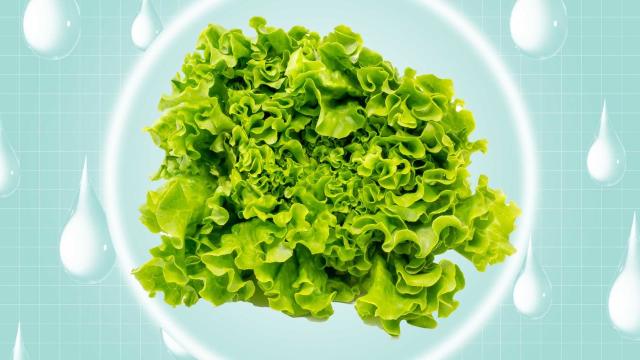The #1 Reason Why You Shouldn't Wash Pre-Washed Lettuce, According to an Expert

If you're a stickler for food safety, you might be vigilant about always washing your fruits and vegetables before you eat them. You might even be one of those people who reads "triple washed" on a bag of lettuce, but still insists on washing it anyway. The problem is that by washing those leafy greens yourself, you're actually increasing your risk of consuming potentially harmful bacteria or another contaminant.
Related: How to Store Lettuce So It Stays Crisp and Fresh
Not convinced? Here's what a registered dietitian says about why you shouldn't wash your pre-washed lettuce at home.
Pre-washed lettuce is already about as safe as it gets.
"Leafy greens in sealed bags labeled 'triple washed,' 'washed' or 'ready-to-eat' are produced in a facility inspected by a government regulatory authority and operated under Good Manufacturing Practices ," says Neva Cochran, M.S., RDN, LD, a dietitian, nutrition communications consultant and an advisory panel member to the Leafy Greens Marketing Agreement. These practices are set by the Food and Drug Administration, and all food manufacturing facilities must follow them. They include things like personal hygiene of workers, design of a facility, maintenance of equipment, sanitation, and process controls during production and packaging.

Getty Images / Roberto Bucci / EyeEm / Yamada Taro
Your home kitchen isn't subject to these same sky-high standards for safety and cleanliness.
"Washing them again [at home] can actually increase the risk for leafy greens to pick up bacteria from your sink, countertops, cutting boards, knives, colanders, salad spinners, bowls or other items or surfaces in your kitchen the greens might come in contact with during the washing process," Cochran says.
A few years back, the Centers for Disease Control released a video that outlined why you shouldn't wash poultry in your sink: because potentially harmful bacteria from the chicken might splatter around your kitchen and contaminate other foods. Predictably, people went nuts, and many couldn't imagine not washing their chicken before cooking it.
The idea behind not washing your leafy greens is in that same vein (and will probably have an equally polarizing reaction). Simply put, there are so many germs and bacteria in your sink—particularly if you're washing poultry and other raw meat in there—that washing will do more harm than good. Plus, since you typically eat lettuce raw, there's no chance for potentially harmful compounds to be neutralized by heat during the cooking process.
Trust that your pre-washed lettuce is ready to eat.
That bag of salad mix in your fridge has already undergone a three-step process to make sure there's no bacteria or foreign objects. The three steps in triple-washing include:
A pre-wash at the farm to remove rocks, debris and insects
Being passed through two separate baths of sanitizing liquid at the processing site
Being safely dried and packaged
If you buy unwashed greens, then you do have to wash them—here's how to do it.
"First, wash your hands with warm water and soap for at least 20 seconds before and after handling the leafy greens," Cochran says. "Then use hot water and soap to clean all surfaces like sinks, countertops, bowls, salad spinners, colanders and strainers that will be used in washing the leafy greens."
If you're working with a head of lettuce or a bunch of greens, first remove the core or stems, so that you're left with just the leaves. If you have pre-packaged, unwashed greens, then the leaves should already be separated.
"Separate and individually rinse the leaves under cold running tap water," Cochran says. "For leaves that can't easily be held under running water, place them in a bowl of cold water for a few minutes to loosen sand and dirt." Transfer the greens to a strainer or colander to drain excess liquid, then dry them with a clean cloth or (preferably) paper towel.
Obviously, you shouldn't use bleach or detergent to clean the greens, because they're not meant to be consumed. "??The FDA also advises against using commercial fruit and vegetable washes because they may leave residues," Cochran says. "Plus their safety and effectiveness have not been thoroughly tested or standardized." It's even possible that they're less effective for washing than water alone.
The bottom line
The safest way to eat leafy greens is to buy them pre-washed. Unless you follow strict food safety guidelines and regularly invite a health inspector into your home, your kitchen just isn't as clean as a commercial facility. Best to leave the washing to the experts.